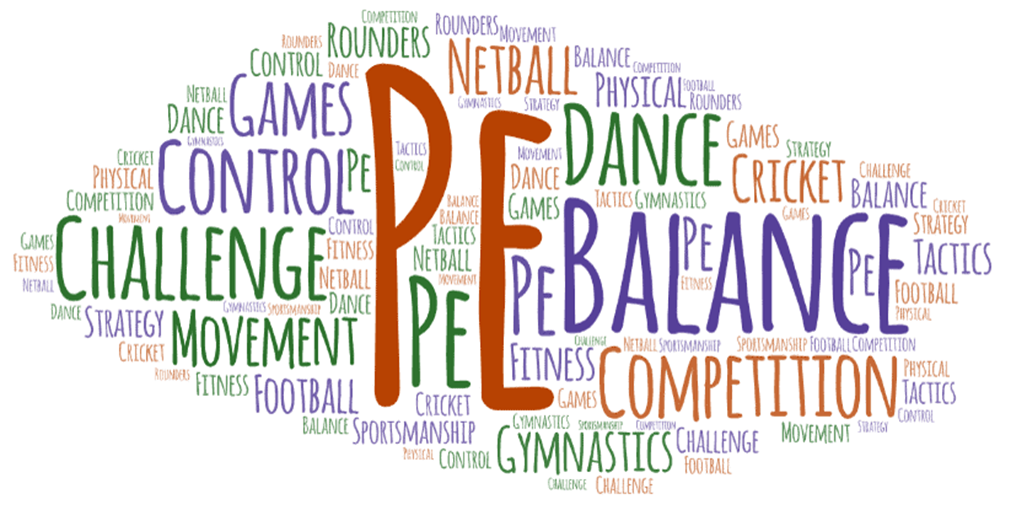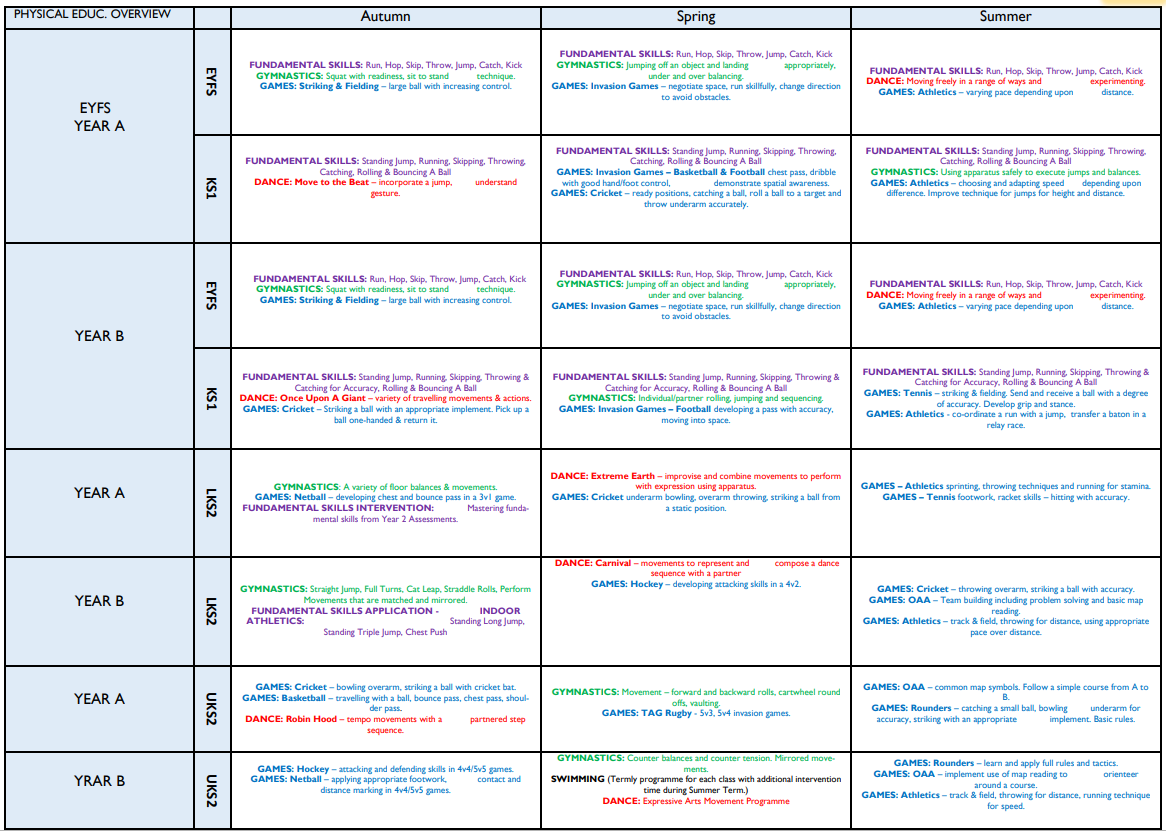PE
Subject Lead: Miss Emily Bickerstaffe

At Weeton St Michael’s C of E Primary School, our vision is to provide our children with a high quality, inclusive education inspired by Christian Values. Excellent teaching and learning form the basis of all our work delivered through a caring, creative ethos.
Our children are encouraged to have a positive attitude, develop resilience in their approach to learning, become confident in their own ability, independent and motivated to achieve their full potential.
We believe that it is our duty to make learning fun, engaging, memorable, accessible and ambitious for all children, instilling in them a love of learning.
We take seriously our duty to teach children about the fundamental British Values of mutual respect and tolerance, democracy, the rule of law and individual liberty. These values are woven through our curriculum so that our learners leave us prepared for life in modern Britain.
Physical Education: Our Intent
At Weeton St Michael’s, we aim to engage, motivate and inspire children to develop a love of physical activity, games and promote long term healthy lifestyles. We recognise the benefits of a strong Physical Education curriculum and extra-curricular activity on raising children’s aspirations and self-esteem. P.E. teaching at Weeton St Michael’s follows all requirements of the National Curriculum for Physical Education; providing opportunities for all pupils to become physically confident in a way which supports their health and fitness long term.
We hope to develop the children into confident and competent learners across a broad range of physical activities, by providing them with a wide range of opportunities to participate in physical exercise, both in a competitive and non-competitive environment. We provide opportunities to compete in a range of sports and other activities that build character, and help to embed values such as fairness and respect.
Through external partnerships, our children are invited to attend festivals and tournaments throughout the year at both inter and intra school levels. We continue to build a love of sport and physical activity amongst our pupils, by offering a broad range of lunchtime activities and self-assessed play through our OPAL partnership. We hope that through all the sporting opportunities, we can support the children in demonstrating sportsmanship, resilience, respect and leadership values throughout their school life.
In addition, our curriculum aims:
- To develop competence in a broad range of physical activities
- To encourage healthy and active lives
- To encourage children to work and play with others in a range of group situations;
- To develop the way children, perform skills and apply rules and conventions for different activities;
- To increase children’s ability to use what they have learnt to improve the quality and control of their performance;
- To teach children to recognise and describe how their bodies feel during exercise;
- To develop the children’s enjoyment of physical activity through creativity and imagination;
- To develop an understanding in children of how to succeed in a range of physical activities and how to evaluate their own success.
Our Physical Education curriculum supports pupils to meet the National curriculum end of Key stage 1 and 2 attainment targets.
EYFS
Physical Development
ELG: Gross Motor Skills Children at the expected level of development will:
• Negotiate space and obstacles safely, with consideration for themselves and others.
• Demonstrate strength, balance and coordination when playing.
• Move energetically, such as running, jumping, dancing, hopping, skipping and climbing.
ELG: Fine Motor Skills Children at the expected level of development will:
• Hold a pencil effectively in preparation for fluent writing – using the tripod grip in almost all cases.
• Use a range of small tools, including scissors, paint brushes and cutlery.
• Begin to show accuracy and care when drawing.
Key Stage 1
Pupils should develop fundamental movement skills, become increasingly competent and confident and access a broad range of opportunities to extend their agility, balance and coordination, individually and with others. They should be able to engage in competitive (both against self and against others) and co-operative physical activities, in a range of increasingly challenging situations.
Pupils should be taught to:
- master basic movements including running, jumping, throwing and catching, as well as developing balance, agility and co-ordination, and begin to apply these in a range of activities
- participate in team games, developing simple tactics for attacking and defending
- perform dances using simple movement patterns.
Key Stage 2
Pupils should continue to apply and develop a broader range of skills, learning how to use them in different ways and to link them to make actions and sequences of movement. They should enjoy communicating, collaborating and competing with each other. They should develop an understanding of how to improve in different physical activities and sports and learn how to evaluate and recognise their own success.
Pupils should be taught to:
- use running, jumping, throwing and catching in isolation and in combination
- play competitive games, modified where appropriate [for example, badminton, basketball, cricket, football, hockey, netball, rounders and tennis], and apply basic principles suitable for attacking and defending
- develop flexibility, strength, technique, control and balance [for example, through athletics and gymnastics]
- perform dances using a range of movement patterns
- take part in outdoor and adventurous activity challenges both individually and within a team
- compare their performances with previous ones and demonstrate improvement to achieve their personal best.
 Our Physical Education Curriculum Topic Overview
Our Physical Education Curriculum Topic Overview
Our progression document (appendix 1) details the precise knowledge taught in each unit of work.
Implementation
To successfully embed our Physical Education values at Weeton St Michael’s, the staff and children are involved with the following:
- We provide each year group with at least 2 hours of exciting, fun and active P.E. lessons each week.
- Teachers at Weeton follow the Lancashire P.E. scheme of work. This offers well planned sequences of learning, fulfilling every aspect of the National Curriculum, offering regular assessment opportunities and building in core sporting values such as resilience and respect. EYFS focus on the fundamental movement skills and develop the fine and gross motor skills of the children, so they are ready to begin accessing the different parts of the P.E. curriculum from Year 1. The fundamental movements remain embedded in Key Stage 1 practice to allow for repetition and continued physical development.
- The P.E. Passport App is used to support the planning, assessment and delivery of curriculum P.E.
- Teaching sequences or chosen topics within lessons across year groups have been carefully considered and mapped out. This ensures the children all gain a wide coverage of skills, access a wide variety of physical activities and allows for clear progression throughout school.
- Children in KS2 attend Ribby Hall for their swimming lessons in Autumn Term, in order to reach the required level of competency for swimming and water safety by the end of Key Stage 2.
- Curriculum resources are selected with the intent of supplying teachers with the means of delivering high quality lessons and introducing the children to a wide range of games, sports and physical activities within their lessons.
- At lunchtimes, the children on school meals have a well-balanced menu to choose from. We only allow healthy snacks to be eaten during break times.
- Teachers are encouraged to use active brain breaks during school time involving short vigorous aerobic activity.
- A broader experience of a range of sports and activities are offered to all pupils through the Carr Hill Rural Fylde School’s Partnership.
- House Captains and Ambassadors model sportsmanship qualities to the KS1 children in their role throughout the year.
- In KS2, the children are given the opportunity to develop their leadership skills by leading PE warm ups and activities.
- Introducing OPAL at play times for children to use their imagination and creativity to participate in physical activity
Children with Special Educational Needs and Disabilities
At Weeton St Michaels we ensure participation of all pupils in PE lessons so that all children can enjoy physical education and achieve well. Planning will identify how we adapt learning appropriately so that pupils can access all aspects of PE, including extra-curricular opportunities. Furthermore, we utilise adapted equipment in lessons to allow children to participate and it can provide equitable competition.
More Able Children
We aim to ensure more able children are well equipped with a variety of skills during physical education. This may see them taking on a leadership role, official role (umpire) and competitive role. More able children are encouraged to join local sports clubs where they can further develop their talent within a particular sport.
Impact
We aspire for all our children to be engaged, motivated and happy when it comes to Physical Education. We aim for all our children to have secured age-related skills and knowledge before they leave our school. This equips them with the ability to successfully prepare for a long term healthy and physical life ahead in which they can make informed choices about physical activity. In addition to this, we strive for our children to be knowledgeable about healthy competition, team building and resilience in the wider world.
The impact of our Physical Education curriculum can be measured and monitored in a variety of different ways including; learning walks, PE Passport scrutiny, data analysis and tracking and pupil interviews. It is the responsibility of the subject leader to triangulate this evidence to ensure consistency across the whole school. Teachers use the P.E Passport App as well as the P.E progression of skills document (Years 1 to 6) or the EYFS Early Learning Goals to deliver high quality P.E lessons and assess the children as they progress through school. These documents ensure every objective of the National Curriculum is met and that teachers have the tools with which to deliver outstanding P.E and sport provision. Throughout PE lessons, children are actively involved in their target making and progress, teachers provide verbal (in the moment) feedback and support. At Weeton St Michael’s we strive to include all children of differing abilities in Physical Education and ensure provision is made for SEND children in the school.
We endeavour to raise the profile of Physical Education in school by ensuring that we offer a wide range of opportunities for all of our children and allow the children to engage in competition as often as possible. As skills improve and high-quality P.E. teaching is embedded across school, we should see improved participation levels in school competitions. These competitions provide a perfect stage for the sporting and character values that are integral to our P.E. lessons to be reinforced, ensuring our children leave primary school knowing the importance of etiquette, team-work, perseverance, respect, acceptance and sportsmanship.
We will review and develop the curriculum on an annual basis
